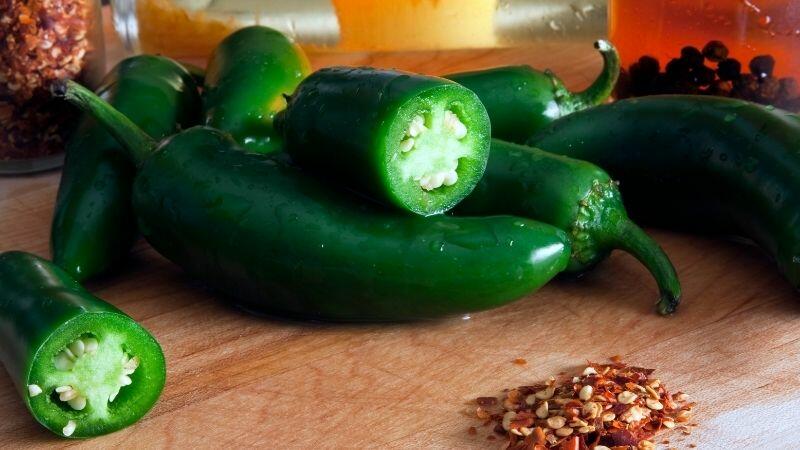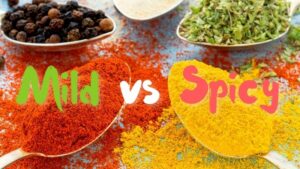Have you ever taken a bite of a spicy pepper and felt your mouth erupt in fiery heat? Then you know about Scoville units, the scale used to measure a chili’s pungency. But what does a spicy rating of 8000 SHU actually mean in terms of flavor and burn?
At 8000 Scoville heat units, a chili pepper lands right in the middle range, indicating a medium
- 100-1,000 SHU = Mildly Spicy
- 1,000-25,000 SHU = Medium Spicy
So an 8000 SHU chili like the jalapeño will add noticeable but not extreme heat. The spiciness stimulates your palate without scorching it!
In this article, you’ll learn more about Scoville units and discover examples of peppers that score an 8000 on the scale. Get ready to turn up the heat on your spicy food knowledge.
What are Scoville Heat Units?
The Scoville scale was created in 1912 by a pharmacist named Wilbur Scoville. He devised a test to measure chili heat by diluting pepper extracts in sugar water until tasters could no longer detect the
The number of dilutions required to reach this point became the “Scoville Heat Unit” rating. A higher number indicates more dilution needed to tone down the heat, meaning the pepper is spicier.
For example, a sweet bell pepper scores 0 SHU since it contains no capsaicin, the chemical that gives chili peppers their spicy kick. On the other end of the scale, the Carolina Reaper tops out at over 2 million SHU!
Is 8000 SHU Considered Hot?
On the Scoville scale, 8000 SHU lands right in the middle, indicating a medium heat level. According to the ratings:
- 100-1,000 SHU = Mildly Spicy
- 1,000-25,000 SHU = Medium Spicy
- 25,000-70,000 SHU = Hot and Flavorful
- 70,000+ SHU = Very Hot
So at 8000 Scoville units, you can expect a chili pepper to have noticeable heat but not an extreme burning sensation. It adds pleasant
Examples of 8000 SHU Chili Peppers
Some well-known chili varieties register around 8000 on the Scoville meter:
- Jalapeño – 2,500-8,000 SHU
- Guajillo – 2,500-8,000 SHU
- Puya – 5,000-8,000 SHU
- Costeño – 8,000-12,000 SHU
The classic jalapeño is a perfect example of an 8000 SHU pepper. It’s a chili staple, used both fresh and pickled, adding a crisp pop of heat to dishes like nachos and salsa.
Foods and Sauces with 8000 SHU
It’s not just chili peppers that can register 8000 on the Scoville scale. Many prepared foods and hot sauces also aim for that medium heat level. Here are some examples:
- Tabasco Chipotle Sauce – 7,000-8,000 SHU
- Cholula Hot Sauce – 3,600-8,000 SHU
- Buffalo Wings with Spicy Sauce – Around 8,000 SHU
- Flamin’ Hot Cheetos – Estimated 2,500-4,000 SHU
- Spicy Thai Food – Green curries around 5,000-8,000 SHU
When dining out or grabbing a quick snack, look for dishes described as “spicy” or “hot.” They likely contain ingredients in the 8000 SHU range to give your tastebuds a kick, but not overwhelm them. Start slowly and work your way up as your palate adapts.
How Does 8000 SHU Feel in Your Mouth?
When you bite into a chili with around 8000 Scoville units, you’ll notice the heat right away. Your tongue and lips will start to tingle, sending a spicy sensory jolt to your brain.
Some people may get flushed, sweat a bit, and need to gulp some water. But the burn probably won’t have you gasping for relief. For chiliheads, 8000 SHU makes for a pleasant, manageable mouth fire.
The heat builds steadily, lingering for a few minutes after you swallow. While the jolt fades, you’re left with a warm glow and craving for more. The spiciness stimulates your palate without scorching it.
Can You Increase Your Tolerance?
Yes! Start slowly with mild salsa and work up to hotter varieties. Your brain will release endorphins to counteract the “heat” from capsaicin, making spicy food addictive over time. Just pace yourself to avoid misery.
Pay attention to your body’s signals, and don’t push past your limits. With practice, you can train yourself to handle more
The Takeaway on 8000 SHU Chilis
An 8000 rating means a chili pepper brings noticeable but not extreme heat, landing in the “medium spicy” range of the Scoville scale. If you’re new to spicy food, it’s a great place to start expanding your palate beyond mild flavors before working up to the five-alarm dishes. Just keep some yogurt handy to tame your taste buds!





